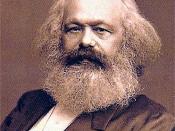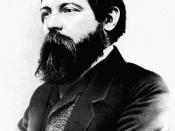MARXISM
Marx and Engels; View of the individual in: The German Ideology:
In the text 'The German Ideology', Karl Marx and Friedrich Engels reject the notion of identity. Instead declaring that nothing can be regarded in static isolation or exist independently, as everything must be viewed in its relations with class, economic structure, ideology and history. Implying that to discuss 'the worker' is thus to speak about the employer, about social classes and their conflicts, consciousness, morality, behaviour, politics, religion, ethics and so on. Here stressing that any/one thing exists within unseen complex networks of social relations, which are decided by an economic structure. Thus Marx and Engels view human beings in terms of material relations of production and labour, choosing not to recognise an individuals character or genius, (such as an authors creative ability) insisting instead on a materialistic recognition of the persons relationship to the economic world (such as a authors publisher and the market).
In addition to this they view the finished product (such as a text) not as a result of a persons imagination, but in relation to the circumstances and social issues it was constructed under. Implying that talent is the product of social relations. Therefore, mankind, according to Marx and Engels, adopt to, and are shaped and binded by, the culture and environment in which we live. It is through these communities (the power of individuals united) that freedom, ideas and potential are achieved, as groups produce co-operation, as opposed to individualism which breeds competition. Arguing, moreover, that nothing is innate or individual, it is progressive, constructed out of collective human subjectivity, institutionally created and manufactured by the dominant class in any given historical period.
Marx and Engels; View of the Bourgeoise in: The German Ideology:
This dominant class is...


